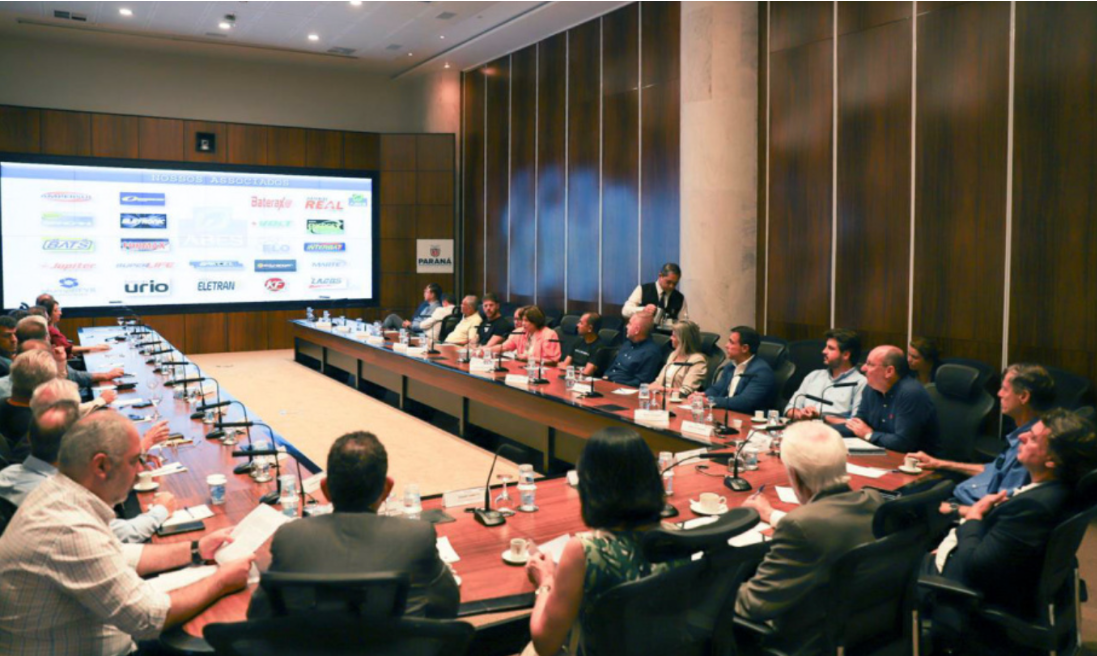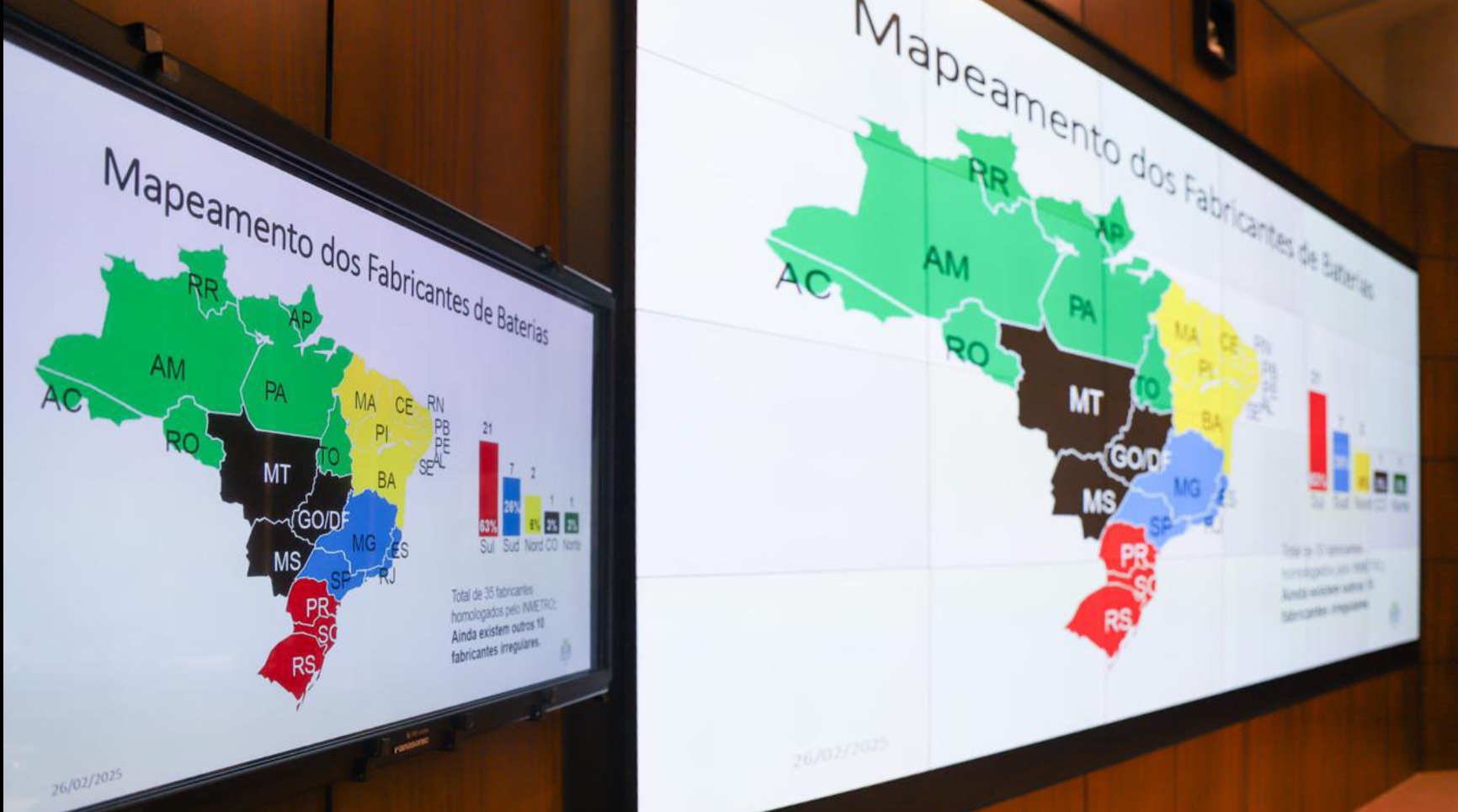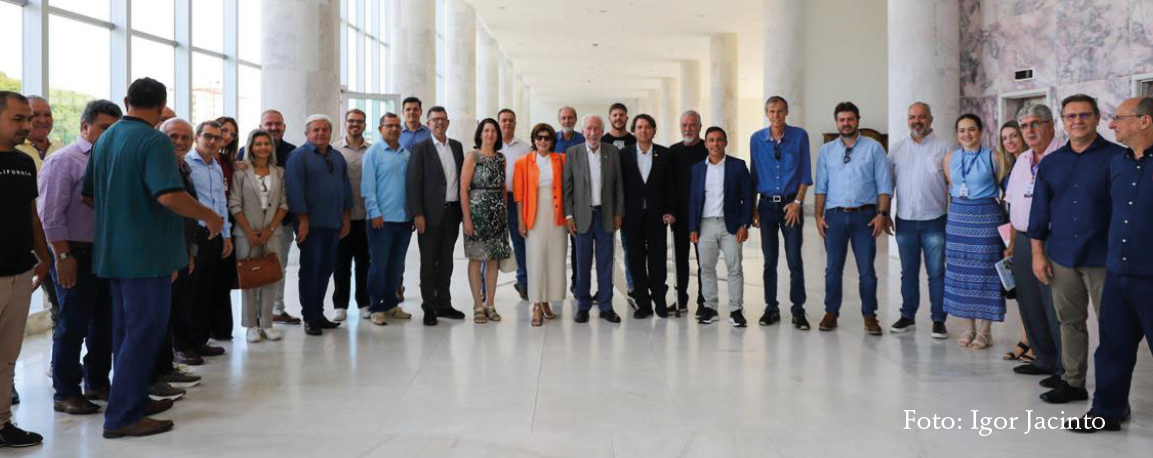Information
• 06/11/2025GOVERNMENT OF PARANÁ DISCUSSES REVERSE LOGISTICS WITH BATTERY MANUFACTURING CHAIN.
THE PURPOSE OF THE MEETINGS WITH THE ACTING GOVERNOR DARCI PIANA WAS TO SHOW THE REVERSE LOGISTICS CHAIN CARRIED OUT BY BATTERY MANUFACTURERS AND HOW THEY CAN ADAPT TO CREATE A PROGRAM THAT COMPLIES WITH ENVIRONMENTAL REGULATIONS.

Acting State Governor of Parana State (Brazil) Darci Piana met with representatives of the Brazilian Association of Sustainable Energy (Abes) on Wednesday February 26 at the Palácio Iguaçu to discuss the state of reverse logistics in Paraná. During the meeting, an overview of Paraná’s participation in battery production was presented, highlighting that the state is home to 54% of Brazil’s battery manufacturers and recyclers.
In the previous week, Darci Piana had already met with the board of the Brazilian Association of Automotive and Industrial Batteries (Abrabat) to discuss the inclusion of Paraná-based companies in an effective reverse logistics policy.
The goal of the new meeting was to showcase the reverse logistics chain implemented by battery manufacturers and how they can adapt to create a program that complies with environmental regulations, such as the need for licensing issued by the Water and Land Institute (IAT), proper disposal of products, fire prevention plans, and more.
For Piana, ensuring proper material disposal through reverse logistics helps maintain Paraná’s status as a sustainability benchmark. “Paraná is the most sustainable state in Brazil and has a well-established reverse logistics policy, which is a national reference. But we always aim to advance in this area to further reduce potential environmental damage,” he stated.
Paraná is a pioneer in the sector, being the first state in Brazil to have a signed reverse logistics plan. Since 2012, the state has had a specific policy, two years after the creation of the National Solid Waste Plan in 2010. Currently, 15 economic sectors have reverse logistics plans, with 30 signatory entities. As a result, the state has established guidelines for implementing and operationalizing post-consumer responsibility and set procedures for incorporating reverse logistics into environmental licensing.
In Paraná, compliance with reverse logistics is among the conditions for the IAT to issue environmental licenses to companies. These companies must annually submit proof of adherence to the reverse logistics plan.

This procedure ensures the proper disposal of products with high contamination potential, such as lead-acid found in batteries.
Companies with environmental impacts must have a reverse logistics plan. From production to final disposal, the responsibility lies with the industry. So, it’s not enough to just sell; they must also collect the battery at the end of its life and ensure proper disposal,” emphasized Rafael Andreguetto, Director of Environmental Policies at the State Secretariat for Sustainable Development (Sedest).
Approximat e ly 91% of the composition of a new battery comes from recycled materials. “Battery reverse logistics has been practiced in Brazil for many years because, to produce a new battery, we necessarily need the old one. Brazil does not extract lead, so we rely on the lead from used batteries, which we call secondary lead,” explained Nilson José dos Santos, Executive Director of Abes.
“Now we are in the phase of submitting documentation and accountability, which is what we are doing here. The idea was to present to Sedest how Paraná’s industries are performing in terms of reverse logistics, both in the state and nationally,” he added.
DISCUSSIONS WITH THE SECTOR
In the previous week, Darci Piana also met with the board of Abrabat to discuss the inclusion of Paraná-based companies in an effective reverse logistics policy. According to Abrabat, the association represents about 70% of the Brazilian lead-acid automotive battery market.
In 2017, Sedest and IAT signed a Commitment Agreement with the Brazilian Institute of Recyclable Energy (Iber), an entity linked to Abrabat, to manage reverse logistics in the sector.
“Our proposal is to support the state in implementing environmental regulations and assist Paraná’s industries in adapting and raising their operational standards. This includes reverse logistics but also environmental regulations in battery production,” explained Alex Pacheco, President of Abrabat. “Paraná holds a very important position in the national industrial battery production scenario. Reverse logistics is a key point for companies to adapt to this flow, ensuring compliance with legislation and proper handling of used batteries,” he emphasized.
PRESENCES
At Wednesday’s (26) meeting, attendees included the CEO of Invest Paraná, Eduardo Bekin; the Director of State Revenue, Suzane Gambetta Dobjenski; State Deputy Anibelli Neto; and representatives from Abes and associated companies. At the meeting with Abrabat, participants included State Finance Secretary Norberto Ortigara; CEO of Invest Paraná, Eduardo Bekin; Abrabat Vice President Andréa Lyra; Chairman of the Board of Baterias Moura, Paulo Sales; and Executive Director of Iber, Amanda Schneider.

Source: Paraná State News Agency.







